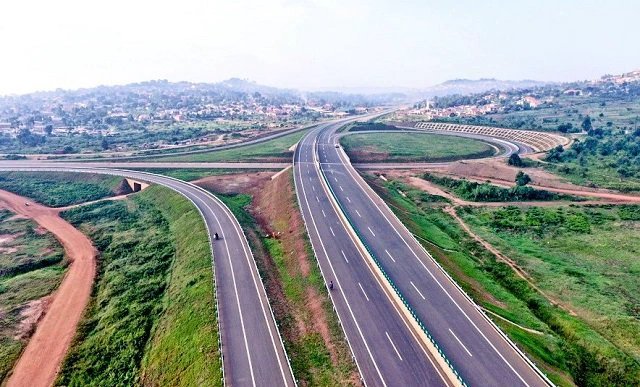Uganda’s rising debt, shrinking lives

How government’s borrowing spree is leaving citizens bearing the country.
At dawn, the roar of engines rises above the quiet streets of Entebbe as David Tumusiime, 47, prepares for his daily commute to Kampala. Like thousands of other motorists, he joins the line snaking toward the Entebbe Expressway, a sleek road built to cut travel time—but one that carries an invisible weight.
Every day, Tumusiime parts with Shs10,000 in toll fees, a small fortune for a mid-level employee supporting a family of five. “It’s convenient, but the cost adds up quickly because of government debt repayments,” he says, his voice tinged with resignation. “If I saved that 10,000 each day, I could buy two kilos of sugar for my family. Those who can’t afford the tolls are forced to use longer, rougher roads that waste fuel and time.”
The Kampala–Entebbe Expressway, financed through a $476 million (approximately Shs1.785 trillion) loan from China Exim Bank, stands as a symbol of ambition—and consequence. Under the financing agreement, the Uganda National Roads Authority (UNRA) will collect tolls for 18 years to repay the loan, with Egis Road Operation contracted to handle day-to-day operations.
As of December 2023, toll revenues had reached Shs75 billion. Every shilling, according to the agreement, goes directly toward repaying the debt. For Tumusiime, who dreams of retiring at 55, that 18-year horizon feels like a sentence his children will serve. “Even when I stop working, the road will still be paying off the loan,” he says quietly. “Maybe my children will still be paying for it too.”
Borrowing in the people’s name
On October 20, 2025, Uganda’s Parliament embarked on the process to approve new loans worth Shs8.3 trillion—touted as funding for roads, energy, and infrastructure projects. Yet for many Ugandans, such approvals evoke as much anxiety as hope.
In the parliamentary chambers, where votes are cast and motions carried, few decisions resonate as deeply through the lives of ordinary citizens. Every loan approved in the air- conditioned hallways of Parliament echoes in the markets, on the farms, and in the small shops where prices creep upward and livelihoods tighten.
Finance Minister Henry Musasizi tabled the new borrowing proposal, seeking funds from lenders including the World Bank and Standard Chartered Bank. He argued that the loans were necessary to sustain key projects and drive economic recovery.
But the presentation was met with tension. Joel Ssenyonyi, the Leader of the Opposition, rose on a procedural point, revealing that he had learned some of the loans had already been signed off by authorities, effectively bypassing parliamentary scrutiny. “If these agreements were signed before Parliament approved them, then we are rubber-stamping decisions already made,” Ssenyonyi cautioned. “This undermines the integrity of this House and the people we represent.”
Speaker Thomas Tayebwa, visibly caught off guard, defended the process. “I am not aware of any prior signings,” he said. “As Speaker, my duty is to forward loan requests to the relevant committees for proper examination.” The exchange left the chamber divided. Opposition MPs warned of eroding accountability, while government MPs insisted that existing mechanisms ensured transparency. Yet outside the chamber, in places like Entebbe and Kikuubo, the debate felt far removed from reality. For citizens like Tumusiime, what mattered was not the procedural wrangling—but the price tag attached to it.
The weight of the ledger
According to the latest Annual Debt Statistical Bulletin (June 2025), Uganda’s total public debt had reached Shs116.2 trillion (US$32.3 billion), approximately 51.3% of GDP. That represents a 26.2% increase from the previous year’s Shs89.5 trillion. Domestic borrowing alone soared by nearly 49% in one year—from Shs40.6 trillion to Shs60.3 trillion—while external debt climbed to Shs55.9 trillion. Much of this domestic borrowing carries higher interest rates, straining national resources and crowding out the private sector.
On October 21, Ramathan Ggoobi, the Permanent Secretary and Secretary to the Treasury, defended the borrowing strategy. He announced that Uganda would receive over $2 billion (Shs7.5 trillion) in concessional financing from the World Bank over the next three years, marking the resumption of support suspended after the enactment of anti-LGBTQ legislation.
“This funding will revitalize key projects in energy, transport, agriculture, and ICT,” Ggoobi said, describing the loans as “a necessary lifeline” for the economy. Yet for many economists, these “lifelines” have become a financial noose—tightening with every new agreement.
The hidden tax on daily life
In the bustling trading hub of Kikuubo, Sarah Nabukenya, a mother of three, arranges sacks of sugar and flour in her stall. “Every year, prices of sugar, salt, and food go up,” she says.
“Transport costs increase, taxes increase. It’s all connected.” For Nabukenya, the link between Parliament’s borrowing decisions and her shrinking profits is direct but invisible. “We don’t see the loans they talk about in our lives,” she adds. “We only feel them when everything becomes more expensive,”



0 Comments